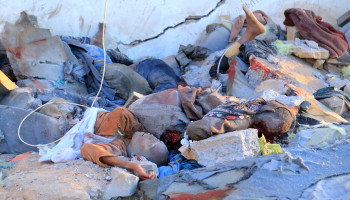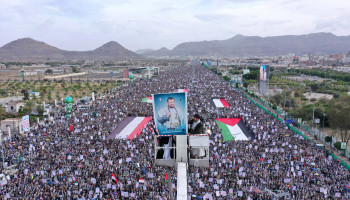With the end of the fifth year and the beginning of the sixth year of aggression against Yemen, there does not seem to be a decision yet for the coalition of countries that declared war to stop it. It is true that the latter declared more than once a ceasefire, but all remained below the serious, sincere and practical level with which the Yemeni Army and Popular Committees could respond, as these offers were mostly attempts to jump over its field losses or attempts to recover and launch subsequent attacks. .
Any observer of the field military situation or the strategic military situation did not and will not, through an objective analytical view, find any possibility for the coalition of aggression to win this war. The areas that the units of aggression and its mercenaries controlled at the beginning of the war began to fade and recede day after day, and t. The last three battles; “Victory from Allah” in Najran, “Al-Bunyan Al-Marsous” in Nahm and Al-Hzm and “Allah Overpowered them” in Al-Jawf and the outskirts of Marib, are the best evidence of the aggression's loss of all the focal points that could have provided it with bases for control, progress, and occupation of Yemeni internal sites.
Moreover, the development of the effectiveness of strategic qualitative weapons possessed by the Army and Popular Committees from ballistic missiles, drones and air defense system --the latter weapon demonstrated an advanced effectiveness in protecting the Yemeni airspace from the launchers of the aggression, its helicopters and its drones-- the aggression lost all possibilities of victory and pursuing the war for it became a mirage, with which its efforts, capabilities and standing were lost without result.
Faced with this inability to achieve any military victory for the aggression and in the face of the impossibility of any field change on the fronts, or political, the aggression, led by Saudi Arabia, has nothing to do but a serious stopping of the war and the search for a settlement or exit that ends the aggression, so why is Saudi Arabia evading this unavoidable decision? What are the implications of its withdrawal from this war now?
Actually, there are many reasons that put Saudi Arabia in the position of those who fear to stop the war now, the most important of which can be identified accordingly:
Morally
The kingdom will find in stopping the war on Yemen now, with the worthless results in terms of the goals it set, which it has not reached, a moral blow to its internal and regional position, as it regionally presents itself as a major country in the Arab and Islamic arenas. It will be in an unenviable position after its withdrawal from the war without achieving any goal, especially after announcing the goals of the “Decisive Storm” at the beginning of the aggression. It will also be forced to accept what it refused at the beginning to discuss.
What does Yemen win?
In any halt to the war now, and with just and realistic conditions representing the reality of the field, military and political situation, the National Front in Sana'a (the Army and Committees) will impose an advanced formula from the internal political point of view, which will not only be in its interest, but also for the benefit of all the Yemeni people and its components as well and in Its basis for the unity of Yemen.
There will be a strong sovereign authority over its decision and its land, capable of managing the country and exploiting its wealth for all of the people of Yemen; an authority able to stand in the face of all countries, peer-to-peer position, from the position of sovereignty and respect for the rights and interests of states, an authority capable of reorganizing and developing Yemen and overcoming the tragedies and effects of the war. This matter, of course, will not be in the interest of Saudi Arabia, which has always considered Yemen as an affiliate or subordinate branch.
What does the axis of resistance gain?
Any cessation of the war now and with the field, political and strategic realities, will constitute a winning point for the axis of resistance, as Yemen today represents with its national powers an essential party in this axis, where the enemy is one and strategic interests are common, in addition to the position and vision from the main enemy; the US-Zionist entity.
On the other hand, stopping the war today by Saudi Arabia, and in light of these positive data in favor of the Sana’a National Front, will constitute an important position for the axis of resistance, as the most strong focal point for this axis is proven on the coasts of the Red Sea, Bab al-Mandab, Gulf of Aden and the entrances to the Arabian Sea and the southern Indian Ocean, in the face of the US-Zionist aggression front, which has long been planning and is planning to weaken this strategic position and extract it from the axis of resistance, by having a weak Yemeni authority that is hostage to Gulf regimes. This pivot in favor of the axis of the resistance and the Yemenis will not be accepted today, neither by Israel nor the United States of America, and Saudi Arabia will find it difficult to happen.
Proceeding from all of this, we can conclude the difficulty of convincing the aggression to stop its war on Yemen, because of the direct and indirect repercussions that this withdrawal from the war on Yemen could create on Saudi Arabia, the UAE, or "Israel" and Washington. However, in the end, and with this rolling course of defeats and moral, military and strategic losses of the coalition of aggression against Yemen and with the escalating course of the capabilities, location and position of the Sana’a National Front in return, the coalition will be forced to stop the war and will be convinced the political settlement that the Yemenis want from their strong position now, just, realistic and fair to all.
Source: al-Masirah website.







